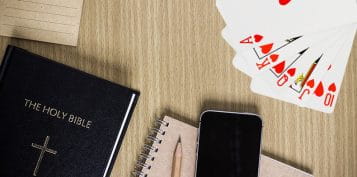The Lottery Story Review – A Piece by Shirley Jackson
More than seven decades ago, Shirley Jackson wrote The Lottery story, and it is still relevant to this day. It was first published in 1948 in The New Yorker magazine, and it raised a lot of eyebrows at the time. Since then, Jackson’s work has been adapted many times, including a short film, a TV movie, even a ballet. Now, let’s dive in to The Lottery story review.

In The Lottery story review, you will learn more about Shirley Jackson’s piece. We will start by telling you about the plot and the main themes in her work. After that, you will find out what was the initial response of the public to The Lottery. Then, we will present you with details about the most popular adaptations of the scary story. Finally, we have prepared answers to the most frequently asked questions about The Lottery.
The Lottery Story Summary
The Lottery by Shirley Jackson was first published in the New Yorker in 1948. It takes place in a fictional town and observes an annual ritual known as ‘the lottery’. Each year one winner is chosen at random. However, the outcome of being selected is shocking and revealed at the very end of the story.
The Lottery Story Plot
In The Lottery story summary part of our piece, you will learn vital details about the plot. Everything takes place in a single day, 27th June, in a contemporary small American town. There are about 300 residents who are excited yet nervous about the annual ritual called ‘the lottery’. Children run around and pick up stones while the townsfolk gather around.
Here, the lottery serves as a harvest ritual to promote fruitfulness. In the story, it is noted that nearby villages have already stopped practising it and that more are to follow. Nonetheless, the people of this small town started the preparations from the night before. Two of the highest-ranking individuals, coal merchant Mr. Summers and postmaster Mr. Graves, prepared paper slips for each extended family in town.

Each of these paper slips is blank, besides one. Later on in the story, we learn that it was marked with a black dot. All slips are folded and put in a black wooden box, safely stored at Mr. Summer’s office until the beginning of the lottery. On the morning of 27th June, the townspeople assemble just before 10, so they can be done by lunchtime.
During the first round of the lottery, the heads of the extended families draw one paper slip each. The papers are unfolded once all slips have been removed. The marked slip is in Bill Hutchinson’s hands, which means that his family has been selected. Tessie, his wife, argues that Mr. Summers rushed her husband through the picking, but the townsfolk dismiss her.
The Hutchinson family is just one household; hence the second drawing to determine the household is skipped. In the final drawing, there is one slip for each family member – Bill, Tessie, and their three children. Sadly, Tessie gets the marked one, and the townsfolk pick up stones and begin throwing them at her. The story finishes with the lottery winner screaming about the injustice that comes with being the chosen one.
The Lottery Short Story Theme
Let’s focus on the theme of The Lottery story by Shirley Jackson. In this piece, the author carefully and masterfully used contrast to tell a horrifying tale. One of the main ideas of The Lottery story is the scapegoat – a goat that is to be released into the desert to take away the sins of the community. The annual lottery serves as a purification ritual that purges the bad.
Another important point in Shirley Jackson’s piece is about mob psychology. More specifically, people can act out of character, cruelly even, as part of a large group that behaves in a certain manner. The story’s setting is a small American town on a blissful summer day with kids running around. This was specifically designed to demonstrate that violence and evil can occur anywhere.
Furthermore, the author presents us with the idea that people can turn against each other very easily. Towards the end of the story, we see how Tessie’s children begin to throw stones at her. Another key point of the story is about groups of people that blindly follow traditions to a tee with no remorse for the consequences.
The Public’s Reaction to The Lottery Story by Shirley Jackson
The initial response to the fictional story was negative and this surprised the writer and the magazine. The New Yorker saw a dramatic increase in cancelled subscriptions and hate mail regarding the story. Moreover, The Lottery triggered many readers, which led to the highest volume of mail the magazine has ever received in response to a work of fiction.
The Lottery short story by Shirley Jackson was often misunderstood by the public, and many demanded an explanation. About a month after the first publication, the author wrote an answer for the San Francisco Chronicle, where she said that The Lottery is a difficult story to be told, yet she hoped that it would shock the readers.
At the time, The New Yorker did not keep phone records; however, all letters addressed to Jackson were forwarded directly to her. She was taking home 10 to 12 letters each day during the summer of 1948. Furthermore, Jackson received weekly packages with letters and questions addressed to Harold Ross (The New Yorker’s editor at the time).
The Lottery Short Story Adaptations
The Lottery short story has been reprinted numerous times in magazines, anthologies, textbooks, and it even has comics adaptations. Besides all that, Jackson’s iconic piece has been adapted for radio, live television, a ballet in 1953, and two movies in 1969 and 1996, an opera, and a one-act play by Thomas Martin. Here are the three most popular recreations of The Lottery:
1951 Radio Version
At the beginning of 1951, a radio adaptation by NBC of The Lottery was broadcasted. It was an episode of NBC’s series Presents: Short Story. Ernest Kinoy took some creative freedom and expanded the plot by adding new scenes between the characters. The writer also removed certain characters and added new ones to the story to enrich it. Overall, the radio adaptation kept the original storyline with some minor tweaks here and there.
1969 Film Version
Shirley Jackson’s short story The Lottery was taken to the big screen in 1969 thanks to Larry Yust’s short film adaptation. The movie was produced as part of Encyclopedia Britannica’s Short Story Showcase series. The Academic Film Archive even called it ‘one of the two bestselling education films ever’. Speaking of which, you can check out the short film down below, just click the play button.
The short film had a ten-minute commentary Discussion of The Lottery by James Durbin – English professor at the University of South California. Furthermore, Yust’s adaptation of The Lottery seems very natural and authentic to the small-town lifestyle. The film features pickup trucks and some of the townspeople of Fellows and Taft, California.
1996 TV Film Version
A few decades later, in 1996, another movie adaptation of The Lottery came to light. It aired on NBC as a sequel loosely based on the original story by Shirley Jackson. Anthony Spinner took the story’s main idea and told it in his own unique way, so very few things were kept. Let’s check out the main stats about the TV film adaptation of The Lottery.
| 🌇 Name: | The Lottery |
| 📅 Premier Date: | 29th September 1996 |
| 🎭 Genres: | Drama, Horror, Thriller |
| 🎥 Directed by: | Daniel Sackheim |
| ✍️ Written by: | Shirley Jackson (short story), Anthony Spinner (television story) |
| ⭐Cast: | Dan Cortese, Keri Russell, Veronica Cartwright |
| 🎬 Runtime: | 1h 40min |
| 🍿 IMDb Score: | 6/10 |
| 🍅 Rottentomatoes Score: | 3.2/5 |
The main character, Jason, is played by Dan Cortese and his co-star is Keri Russel as Felice. At the start of the film, Jason’s father is on his deathbed, and asks him to spread his ashes over the top of his wife’s grave. As a young boy, Jason and his dad moved into the city, so he remembers very little of his mother or town.
It all seems like a perfect little town; once Jason returns, he begins to remember certain things. Jason recalls the significance behind why most tombstones carry the same date and month, one for each year. He is trapped in the annual lottery and remembers the one as a child.
If you are in a mood for more gambling movies, then we suggest you check out the all-time classics The Hustler or The Cincinnati Kid. Both of them are worth-watching films that will keep you entertained, just like when playing at the best gambling sites UK.
Popular Questions About The Lottery
Hopefully, this The Lottery story review has addressed all your queries about it. However, we know that some of you might be eager to learn more about Shirley Jackson’s short story. Hence, we prepared answers to the most common questions on the topic; make sure to check them out!
Similar Articles


